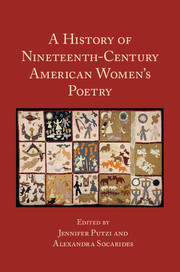Book contents
- Frontmatter
- Contents
- List of Illustrations
- List of Contributors
- Acknowledgments
- Introduction: Making History: Thinking about Nineteenth-Century American Women's Poetry
- PART I 1800–1840, AMERICAN POESIS AND THE NATIONAL IMAGINARY
- PART II 1840–1865, UNIONS AND DISUNIONS
- PART III 1865–1900, EXPERIMENT AND EXPANSION
- 17 Women Poets and American Literary Realism
- 18 Verse Forms
- 19 Braided Relations: Toward a History of Nineteenth-Century American Indian Women's Poetry
- 20 Frances Harper and the Poetry of Reconstruction
- 21 “hear the bird”: Sarah Piatt and the Dramatic Monologue
- 22 Women Writers and the Hymn
- 23 Women Poets, Child Readers
- 24 Emma Lazarus Transnational
- 25 The Creation of Emily Dickinson and the Study of Nineteenth-Century American Women's Poetry
- Suggested Further Reading
- Index
21 - “hear the bird”: Sarah Piatt and the Dramatic Monologue
from PART III - 1865–1900, EXPERIMENT AND EXPANSION
Published online by Cambridge University Press: 21 January 2017
- Frontmatter
- Contents
- List of Illustrations
- List of Contributors
- Acknowledgments
- Introduction: Making History: Thinking about Nineteenth-Century American Women's Poetry
- PART I 1800–1840, AMERICAN POESIS AND THE NATIONAL IMAGINARY
- PART II 1840–1865, UNIONS AND DISUNIONS
- PART III 1865–1900, EXPERIMENT AND EXPANSION
- 17 Women Poets and American Literary Realism
- 18 Verse Forms
- 19 Braided Relations: Toward a History of Nineteenth-Century American Indian Women's Poetry
- 20 Frances Harper and the Poetry of Reconstruction
- 21 “hear the bird”: Sarah Piatt and the Dramatic Monologue
- 22 Women Writers and the Hymn
- 23 Women Poets, Child Readers
- 24 Emma Lazarus Transnational
- 25 The Creation of Emily Dickinson and the Study of Nineteenth-Century American Women's Poetry
- Suggested Further Reading
- Index
Summary
For much of the latter half of the nineteenth century, American poet Sarah Piatt wrote and published poems that gave voice to women and children, that grieved the loss of loved ones and moral certainty, and that revealed an unnerving inclination for self-conscious complexity. Some of the most culturally influential periodicals of her time – Atlantic Monthly, Harper's Weekly, Scribner's – circulated hundreds of her poems, as well as reviews of the many collections of these poems in book form. These reviews were, by turns, delighted and discomfited by what they called Piatt's “distinctiveness,” heralding her as one of America's geniuses even as they cautioned her against apparently unbecoming subtlety and obscurity.
Among the things that distinguished Piatt was her obvious interest in the contextual dynamism of spoken language and the poetic genre that seemed particularly well suited to capitalize on and examine it: the dramatic monologue. Over the course of her career, Piatt wrote more dramatic monologues than any other nineteenth-century American poet. Though many Piatt scholars have addressed dramatic monologues in the context of essays about Piatt's irony or ambivalence, and in terms of her place among Confederate poets or in postbellum magazine culture, no one has yet read her dramatic monologues primarily through the lens of genre. That is what I do here. In the pages that follow, I describe the generic conventions of the dramatic monologue that are integral to Piatt's experiments with it, building an interpretive framework out of the doubleness inherent to the genre. I ground that analysis in Piatt's fifth collection, Dramatic Persons and Moods (1879), because it provides the poems I address with a shared print context, the very title of which directs the reader's eye to genre. What emerges is a clear picture of how Piatt manipulated the particular conventions of the dramatic monologue in order to anatomize the way women maintained and disrupted the very conventions that restricted their range of experience and expression in their roles as mothers and daughters, readers and writers.
- Type
- Chapter
- Information
- A History of Nineteenth-Century American Women's Poetry , pp. 345 - 358Publisher: Cambridge University PressPrint publication year: 2016



